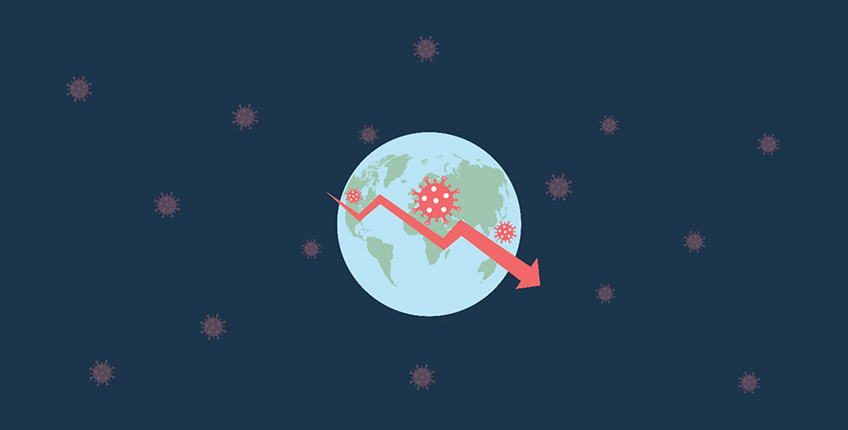Economic Gardening and COVID-19

The Purdue Center for Regional Development (PCRD) has been providing the Economic Gardening program to second-stage companies in Indiana for the past four years. In light of the challenging times facing many Indiana companies as a result of COVID-19, PCRD is sharing valuable information recently prepared by Chris Gibbons, the founder of the National Center for Economic Gardening. It focuses on the potential economic impact of COVID-19 and draws on Gibbons 30-plus years of experience in the economic development field.
Some Thoughts on COVID-19 from Chris Gibbons
Several of our colleagues and partners have contacted the National Center for Economic Gardening across the country regarding the possible effects of COVID-19 on our Economic Gardening program. With the caveat that we are neither an expert in pandemics or predicting recessions, here is the thinking of our Center at this point.
Separate Virus Issues From the Recession Issues
It is important to separate the issues of the virus from those of the recession. The virus has both health implications (which are in the hands of health care workers) and economic impacts in terms of a potential recession. It looks like checks will be mailed to most people to keep the money circulating through this short period in which businesses are under a mandatory shut down. Both of those issues are national in scope, and Economic Gardening has no role to play in either of these situations.
The Virus May be Short Term
Most of the projections for the duration of the virus run from a range of a few weeks to 1.5 years. In Wuhan, the virus was reported in November, and by March, they had no new cases (with severe restrictions on movement). Assuming China’s reports were factual and unbiased, it would indicate a 4-5 month range. The virus has been in the US for over two months, and the number of cases is still rising.
- One possibility is that it will have run its course in another 2-3 months. Some of the biggest impacts are to businesses that have been forced to close, especially hospitality and local market businesses.
- It is important to get these businesses money quickly, but that is a federal response. However, as an aside, one of our team members suggested that people buy gift certificates from restaurants and bars now, which could be used when this is over.
What Type of Recession Will it be?
The bigger issue may be what type of recession will it be? Currently, most of the discussions have been around whether the recession will be v-shaped (meaning sharp decline, rapid recovery) or a longer U-shaped recovery over a period of months. The average recession runs about 11-15 months.
Plan for the End of the Recession
- One of the ways to think about recessions is that they eliminate the weakest of competitors — often those with big debt loads or minimal profitability. When these businesses fail, their customer base moves to the remaining businesses. With each round, the remaining businesses get stronger because they benefit from the new customers. The most serious round is the first one. For each round a business survives, it becomes ever stronger.
- In some respects, if a business is financially sound (profitable and not burdened with debt), the slow-down may actually be a benefit. It gives the CEO time to reassess the basic business model, determine if the future is going to be the same as the past and if there is an opportunity in change. Start planning for the recovery now.
It’s Going to be About Sales
- Business is always about sales, in good times and bad. Sales lead to increased wealth and jobs, which is the objective of economic development. Economic Gardening is uniquely focused on that issue.
- In the old economy, the sales process consisted of finding a list of targeted customers and then making cold sales calls to create the motivation and making a case for being the best solution.
- In Economic Gardening, we are looking for motivation that is already established, as indicated by some signal of volatility. This creates a group that is 100% ready to buy; the company just has to make the best case.
- During and after the recession, the goal is going to be making sales in the most efficient and effective manner possible. Economic Gardening creates higher probability sales calls.
Summary
- The COVID-19 virus is a serious pandemic, but the Wuhan experience indicates it may be a 5-6-month event.
- The immediate economic impact is going to fall hard on the hospitality industry and those businesses that were ordered to close.
- Economic Gardening has no role to play in either the health care issues or the short-run economic impact. However, Economic Gardening can be a valuable program when the economy begins to recover.
- We are headed into a recession, which may last a year or so.
- The single biggest implication for Economic Gardening is to help businesses with planning for the end of the recession. Typical Economic Gardening engagements with businesses run a couple of months.
- Research done today will be ready for implementation when the virus is finishing its course.
- The single biggest way to help is to start making sales again. Economic Gardening is uniquely positioned to produce higher probability sales calls. It is the essence of the Economic Gardening program.
PCRD Economic Gardening Program
The Purdue Center for Regional Development is pleased to be able to offer Marketing, Geospatial Analysis and Social Media/SEO research services for growth oriented second-stage firms through our team of Economic Gardening specialists. If our team can be of service to your company, especially during these difficult times, please contact Emily Del Real, Program Coordinator, at edelreal@purdue.edu or Bo Beaulieu, Director, at ljb@purdue.edu.

Dr. Bo Beaulieu is Professor Emeritus of Rural and Regional Development, Purdue Center for Regional Development and the Department of Agricultural Economics. Bo has played a... read more




